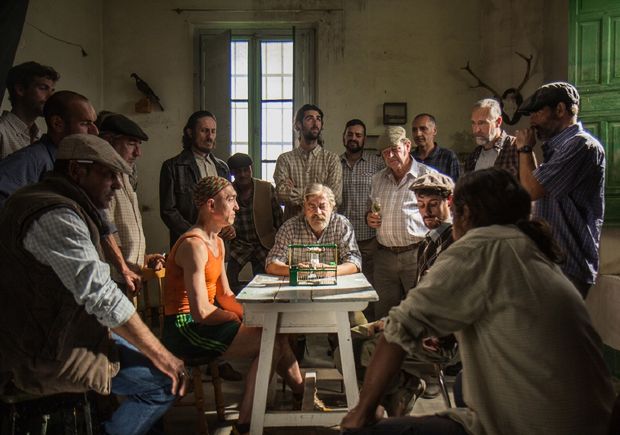Cages (original title Jaulas) is a directorial debut brimming with symbolism and second meanings, but unfortunately short on substance and credibility. Using the titular enclosures and their winged inhabitants as a central motif, Nicolás Pacheco attempts to draw parallels with the similarly trapped underclass of Spanish society, who due to their poverty and their powerlessness are destined to sing the same old songs for eternity. It’s an ambitious allegory with a meritorious message, but unfortunately the execution never quite comes off. That’s due to mostly to three fatal miscues regarding the plot, the tone and the characterisation.
For starters, the slapdash storyline skips from one implausible scenario the next, making it difficult to really get a footing in the film. We open on Antoñito (Manuel Cañadas), a mentally-handicapped man with a flair for imitating birdsong, whose niche skill is exploited by his brother-in-law Canario (Antonio Estrada), a two-dimensional Fagan of the first order. Once Antoñito makes a break for freedom, the focus shifts to his sister Concha (Estefanía de los Santos), an opportunistic but oppressed wife and mother with slack morals, a kind-hearted daughter named Adela (Marta Gavilán) and a recently-bereaved sister called Rosa (Belén Ponce de León). The skittish story then follows Concha’s increasingly desperate attempts to keep her family’s heads above water, with a romantic subplot involving her daughter and a farcical marriage-under-duress tangent thrown in for good measure.
As if these ramshackle narrative structures weren’t enough of a failing, the tone of the movie is similarly incoherent. On scant occasions, there are moments of genuine emotion, such as the reunion and reconciliation of the long-lost sisters and Adela’s almost interminable sense of abandonment. However, such scenes are the exception rather than the rule and are repeatedly undermined by the movie’s tendency to wallow in maudlin melodrama. Its attitude towards its own characters is also inconsistent, emphasising the righteous injustice of certain individuals while playing the no-less unfair plights of others for laughs. It’s all out of goose.
Finally, the thinly-sketched characters themselves barely stray out of their neat little boxes of hero and villain. Sure, there is certainly some crossover with certain individuals, and the unsubtle insinuation is that circumstance rather than human nature is the guilty party. But while the characters do appear to have little volition of their own, their actions seem more dictated by the necessary touchstones of the storyline than the whims of fortune or society. In this way, Pacheco’s efforts leave us less raging against the machine and more rankled by his directorial machinations. A defter hand at the wheel could have injected this parable with pathos and poignancy, but as it stands, it’s as simplistic and unsophisticated as the characters which populate it.
